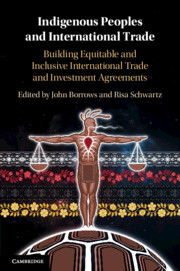 Indigenous Peoples and International Trade
Indigenous Peoples and International Trade from Part II - Building a More Equitable and Inclusive Free Trade Agreement
Published online by Cambridge University Press: 11 June 2020
Amokura Kawharu’s Chapter 11 discusses the “Treaty of Waitangi” exception that is now included in each of New Zealand’s FTAs. The exception is intended to enable the New Zealand government to enact measures in order to give effect to its obligations to Māori under the Treaty of Waitangi, even if the measures are inconsistent with obligations assumed by New Zealand under the FTAs. It has also served as a precedent for other states looking to include a General Exception to protect Indigenous rights. Professor Kawharu examines the circumstances surrounding the adoption and continued use of the exception in New Zealand’s FTA practice as well as the adequacy of the exception in the context of the increasing depth and scale of New Zealand’s participation in FTAs (and, in particular, New Zealand’s expanding commitments with respect to the protection of foreign investment) and proposes options for Māori to consider as means for addressing the issues.
To save this book to your Kindle, first ensure [email protected] is added to your Approved Personal Document E-mail List under your Personal Document Settings on the Manage Your Content and Devices page of your Amazon account. Then enter the ‘name’ part of your Kindle email address below. Find out more about saving to your Kindle.
Note you can select to save to either the @free.kindle.com or @kindle.com variations. ‘@free.kindle.com’ emails are free but can only be saved to your device when it is connected to wi-fi. ‘@kindle.com’ emails can be delivered even when you are not connected to wi-fi, but note that service fees apply.
Find out more about the Kindle Personal Document Service.
To save content items to your account, please confirm that you agree to abide by our usage policies. If this is the first time you use this feature, you will be asked to authorise Cambridge Core to connect with your account. Find out more about saving content to Dropbox.
To save content items to your account, please confirm that you agree to abide by our usage policies. If this is the first time you use this feature, you will be asked to authorise Cambridge Core to connect with your account. Find out more about saving content to Google Drive.